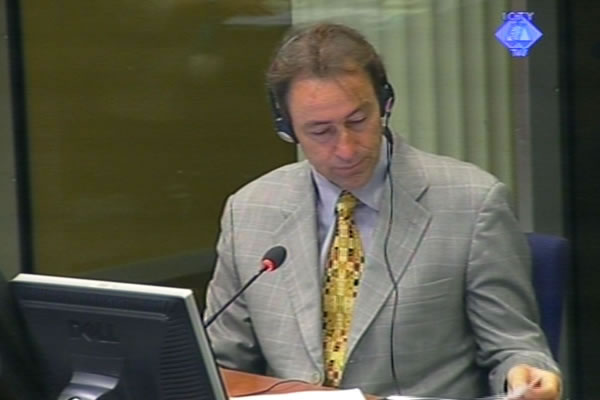Home
DEFENSE: SERBS DID NOT TERRORIZE SARAJEVO, THEY SANCTIONED IT
Ratko Mladic’s defense claimed in the cross-examination that the Serb forces didn’t ‘terrorize’ Sarajevo. They imposed ‘sanctions’ to weaken the enemy side. According to Mladic’s defense counsel, UNPROFOR ‘mostly sided with Muslims’ and ‘predominantly opposed Serbs’ during the war
 David Harland, witness at the Ratko Mladic trial
David Harland, witness at the Ratko Mladic trial David Harland, originally from New Zealand, served as the chief of the civil affairs in the UN mission in BH from June 1993 to the end of the war. In the final part of the examination-in chief he said that he and other UN members ‘never had any doubt that Ratko Mladic was in command of his troops’. Other members of the VRS Main Staff and corps commanders treated Mladic ‘with great respect’ and ‘accorded him primacy’, Harland added. The UN representatives could also see a direct causal link between what Mladic said and what happened in the field, regardless of whether the issues were important or petty.
Mladic’s defense counsel Branko Lukic put it to the witness in his cross-examination that at least 5,000 Serbs were killed in the part of Sarajevo controlled by the BH Army. Harland begged to differ: according to him, some 10,000 persons were killed during the siege. About 10 percent of this number were Serbs. As Harland noted, this was in line with the ethnic composition of Sarajevo during the war. Following in the footsteps of all the other defense lawyers at previous Sarajevo trials, in his cross-examination Lukic put it to Harland that ‘it remains controversial who shot at whom’ and that the BH Army held Serb neighborhoods under siege. According to Lukic, the BH Army had more soldiers and at one point became better armed, while the Sarajevo-Romanija Corps had at its disposal ‘medium quality’ weapons.
In his evidence yesterday, Harland spoke about the ‘eight levers’ used to exert pressure on the BH government and about the ‘terror tap’ Bosnian Serbs would open and close as it suited them. Mladic’s defense counsel put it to Harland that the ‘eight levers’ were not used to ‘terrorize civilians’ but as ‘sanctions’ aimed to weaken the enemy army. Lukic asked Harland ‘what in your view is more drastic – to capture a city with troops or to impose sanctions’. Provided that rules and laws of war were respected and civilians protected, a military capture of a city would be a ‘less drastic measure’ than ‘sanctions’ which include shelling, sniping, and cutting off water, electricity and gas supply, Harland replied. According to him, the war in Bosnia wasn’t a ‘medium intensity war but high intensity gangsterism’.
As Lukic noted, only Serbs in BH were threatened with air strikes. He put it to the witness that the UN ‘mostly sided with Muslims’ and were ‘predominantly opposed to Serbs, that is, the VRS’. Harland denied this claim, saying that Serbs were threatened with air strikes ‘only after they had implemented their terror campaign against civilians’. If the other parties in the conflict had done that at the same scale, Harland was sure they would have been treated the same way as Bosnian Serbs.
In his written statement, Harland said that in his view Serb leaders were ‘not sincere with the international factor’. Was the international factor sincere with Serbs, Lukic asked Harland in turn. The United Nations were ‘truthful’, Harland said, but he did admit that he and General Smith ‘weren’t really that sincere’ when they said after the second Markale massacre that they didn’t know where the projectiles had been fired from.
‘I advised General Smith to be vague about our findings regarding the direction from which the shells had been fired at Markale as a stalling tactic, to give us time to remove UN members from areas controlled by the Serb army before he called in NATO air strike on Serb positions’, Harland explained.
Lukic asked Harland if the representatives of the international community negotiated with Serbs ‘in good faith’ or if ‘as time went by, they increasingly sided with the other faction’. ‘Without a doubt, there were UNPROFOR members, such as myself, who came to realize, as time went by, that it would not be possible to find a solution to stop the war without some form of a military intervention against the Serbs’, Harland replied.
David Harland’s cross-examination will continue tomorrow.
Linked Reports
- Case : Mladic
- 2012-07-10 HARLAND: MLADIC WAS A FRUSTRATED COMBATIVE BULLY
- 2012-07-10 RATKO MLADIC BLAMES SERB CIVILIANS
- 2012-07-09 ORDEAL OF MUSLIMS FROM VILLAGE OF HRVACANI
- 2012-07-12 MLADIC IS UNWELL, TRIAL ADJOURNED
- 2012-07-13 MLADIC UNDERGOES MEDICAL TESTS
- 2012-07-16 MLADIC SHOWS HE IS IN GOOD SHAPE
